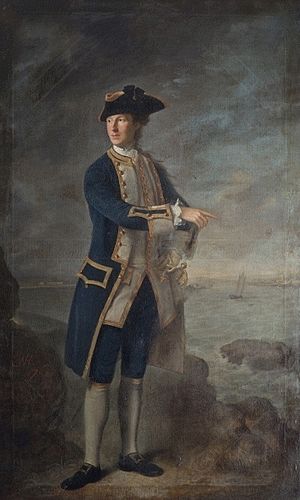Robert Boyle-Walsingham facts for kids
Quick facts for kids
Robert Boyle-Walsingham
|
|
|---|---|
 |
|
| Member of Parliament for Dungarvan |
|
| In office 1758–1768 |
|
| Member of Parliament for Knaresborough |
|
| In office 1758–1761 |
|
| Member of Parliament for Fowey |
|
| In office 1761–1768 |
|
| Member of Parliament for Knaresborough |
|
| In office 1768–1780 |
|
| Personal details | |
| Born | March 1736 |
| Died | 5 October 1780 At sea, off San Domingo |
| Military service | |
| Allegiance | Kingdom of Great Britain |
| Branch/service | Royal Navy |
| Years of service | 1748–1780 |
| Rank | Captain |
| Commands | HMS Crown HMS Badger HMS Jason HMS Boreas HMS Modeste HMS Romney HMS Thunderer |
| Battles/wars | |
Robert Boyle-Walsingham (born March 1736 – died 5 October 1780) was an important Royal Navy officer and a politician. He was born in Ireland but also served in Great Britain. Sadly, he died at sea during a huge storm called the Great Hurricane of 1780. At the time, he was a high-ranking officer, a commodore, on his ship, HMS Thunderer.
Contents
About Robert Boyle-Walsingham
His Early Life and Family
Robert Boyle was born in March 1736. His father was Henry Boyle, 1st Earl of Shannon, a powerful man. His mother was Henrietta. Later in his life, Robert took on the name Walsingham. This happened because he inherited land from a relative, Elizabeth Walsingham.
In 1759, Robert Boyle-Walsingham married Charlotte Hanbury Williams. Her father was Sir Charles Hanbury Williams. Robert and Charlotte had two children:
- Richard (born 1762 – died 1831)
- Charlotte (born 1769 – died 1831)
Their daughter Charlotte later became the 21st Baroness de Ros. This was a special title she claimed in 1806.
Robert Boyle began his journey in the Royal Navy on January 22, 1748. He started as an ordinary seaman on a small ship called HMS Dublin. This was a 12-gun yacht.
- On June 3, 1749, he moved to the ship HMS Assurance. This was a 44-gun frigate.
- He was promoted to midshipman on June 24, 1751.
- Assurance was unfortunately wrecked in 1753.
- After that, he joined other ships, including HMS Cumberland and HMS Anson.
- He passed his test to become a lieutenant in November 1754.
In 1756, Robert was promoted to lieutenant. He served on HMS Revenge. He fought in the Battle of Minorca on May 20. The next year, he became a commander.
Commands and Battles
Robert Boyle-Walsingham commanded several ships:
- His first command was HMS Crown.
- Then he commanded HMS Badger.
- On June 15, he became a post-captain. This was a big promotion. He was given command of the frigate HMS Jason.
He quickly moved to another ship, HMS Boreas.
- In 1758, Boreas fought in the Siege of Louisbourg.
- He also saw action in the Raid on Le Havre in 1759.
After Boreas, he commanded HMS Modeste.
- He fought in the Invasion of Martinique in 1762.
- Later, he commanded HMS Romney. He stayed on this ship until 1763.
His Final Voyage
After a long time without a command, Boyle-Walsingham was given HMS Thunderer in 1778. This was a powerful 74-gun ship.
- He fought in the Battle of Ushant in July 1778.
- He also took part in the Affair of Fielding and Bylandt in 1779.
In February 1780, he was made a commodore. He was sent to the West Indies. On October 5, 1780, he died when Thunderer was lost at sea. The ship was wrecked off San Domingo during the terrible Great Hurricane of 1780.
His Political Life
Besides his naval career, Robert Boyle-Walsingham was also a politician. He served in two different parliaments:
- He was a member of the Irish House of Commons for Dungarvan from 1758 to 1768.
- He was also a member of the British House of Commons. He represented Knaresborough from 1758 to 1761. Then he represented Fowey from 1761 to 1768. After that, he returned to represent Knaresborough from 1768 until his death.
In 1760, a famous artist named Nathaniel Hone the Elder painted his portrait. In 1770, he became a leader in the Freemasons for Kent. He was also chosen to be a Fellow of the Royal Society in 1778. This is a very respected group for scientists and thinkers.
 | Delilah Pierce |
 | Gordon Parks |
 | Augusta Savage |
 | Charles Ethan Porter |

